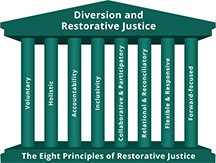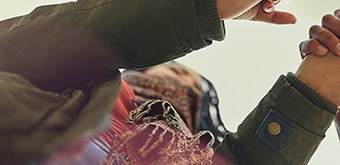Restorative justice is drawn from and developed out of Indigenous principles and processes, both in Canada and around the world. New Brunswick’s restorative justice processes aim to complement and support the commitment to honour Indigenous teachings, customary law, and Indigenous justice.
Restorative justice is considered both a philosophy and a non-adversarial, non-retributive approach to conflict and crime. It emphasizes healing in persons harmed, the meaningful accountability of persons responsible for causing harm, and the involvement of community members in creating healthier, safer, and stronger communities.
In many cases Diversion programs for both youth and adults use restorative justice principles as part of the process. Restorative justice helps to repair harm and address the underlying circumstances that contributed to a crime by providing an opportunity for everyone impacted to communicate, address their needs, and collaboratively participate in the resolution.



